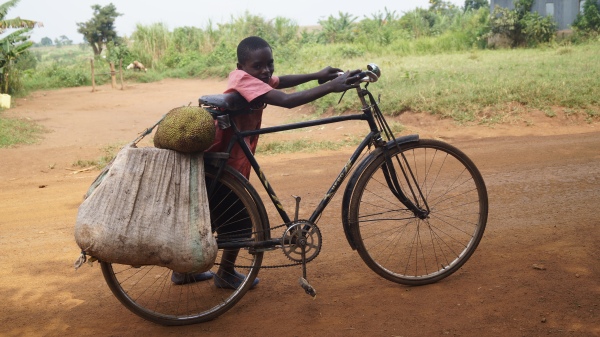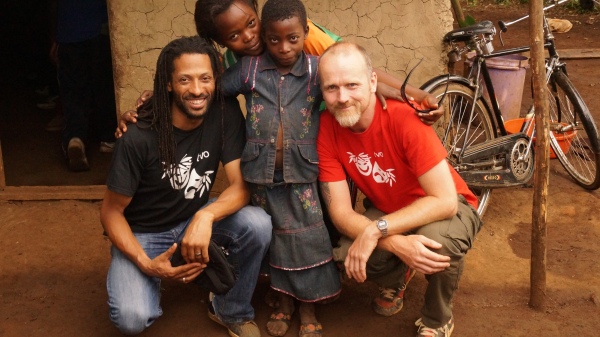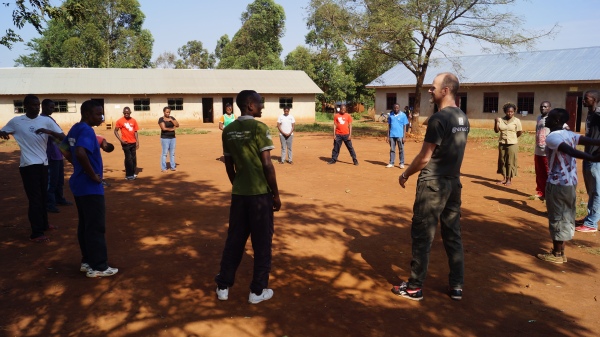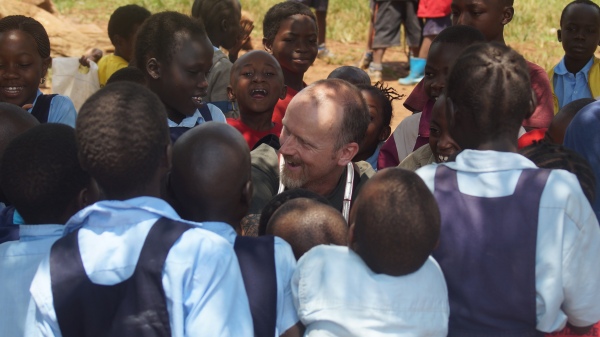It is a somewhat alien feeling sitting at my desk, tapping away at this keyboard listening to some music with a steaming herbal brew for company. I sit in this modest home furnished with the everyday luxuries of electricity, running water and a boiler that heats the place and the aforesaid water supply and I feel somewhat overwhelmed by the immediacy of such services. I have ample enough clothing, food and more importantly a sense of security, of stability, despite some of the press Newport can attract. My feeling of alienation is because after just over 2 weeks of life in Uganda, predominately residing and working in Kyangwali Refugee Camp (pronounced chin-gwa-lee), I can’t quite cope with the level of opulence and comfort that surrounds me. This indeed may sound rather dramatic. I should stress that I did not live in difficult conditions in the camp. The mission of St. Patrick’s is a place of basic comforts for us visitors used to the luxury of ensuite facilities and beds with mosquito nets that our huts provided. No what struck me was the somewhat simplistic and yet sincere attitude to life that is enforced on people when they have fled empty handed to an area that was bereft of any facilities to cope with those in desperate need. That was before this now large camp housing 20,000 plus refugees was developed to the standard it is today although the principles remain the same. All those fleeing civil war and tribal attacks in Congo were given a small piece of land to build a house and to farm for food. That was pretty much it and if you had no experience of either you struggled and many died, and I mean many. If hunger and exhaustion did not take you then malaria would have a damn good go at finishing you off. As the international aid stepped up then so did corruption, greed and dishonesty and as often seems to be the case it was those who were most in need that suffered.

You might expect that anyone who had endured any of the above would be deeply embittered, feel a sense of hopelessness or a strong level of entitlement to any aid or charity available. You might expect them to be very angry at the loss of land, family and entire villages. However despite these incredible conditions I met people who are embracing methods of sustainable living, education and positive community development to gain the empowerment and autonomy that often a refugee is denied. It is this social entrepreneurship that has become a keystone to the curriculum that COBURWAS International Youth Organisation to Transform Africa (CIYOTA) has put together for young people to in still the virtues of self-sufficiency, economic development and repatriation. They are not interested in being victims. They are critically aware, through their own experiences of suffering, that they cannot depend upon anyone and they see the camp as a temporary solution despite its steady growth. Such is the success of the education programme that it has been promoted across Africa, USA and Europe.

As the news today centres on further displaced people in Iraq and the delicate ceasefire in Gaza I wonder when events such as this will ever stop. But in Kyangwali, and under the leadership of CIYOTA, there may be a solution. For the formation of this organisation, programme of development and education model was not down to experienced professionals or government consultants. It was the work and commitment of a group of young people in their early teens that decided that children who had been orphaned or arrived at the camp alone needed education opportunities to improve their status, to develop problem solving skills and a united and self-sustaining community. Critically it also addressed the issues of tribal warfare and revenge attacks as any development could only thrive if it was possible to forgive those that had caused chaos back in the DRC. The success of the programme has led to one of CIYOTA’s founder members being listed in the top 99 of youth world leaders. And it was on arrival in Kampala, at the modest offices that CIYOTA members occupy and reside in the old part of the city, that I first met Joseph and fellow director Benson. Their stories alone are of epic tales of overcoming incredible adversity and struggle. You, dear reader, may be wondering what I am doing here. After all I am a performer whose interest has been in devising and developing performances ranging from dance to musicals to absurd public performances. Well the answer is simple. At the heart of the education programme established by CIYOTA is a use of drama games and theatre to develop leadership and team working skills to address issues that have arisen from fleeing and resettling in a new country. Much of this is applied drama that Dr. Jennifer Hartley and her team from TVO have been developing for the last 5 years in the camp. The affect of this work becomes apparent as soon as I meet the New Hope Drama Group and participate in the first workshop of this visit. Theatre has given people the opportunity to forget their troubles for a while, illuminate a sense of playfulness and critically open up a platform to come together and talk.

What will follow will be some of my daily journal entries that I hope captures and conveys some of the spirit and heart of those involved in the day to day running of New Hope Theatre Group, CIYOTA and the people of Kyangwali Refugee Camp. However I will add that this has been one of the most incredible experiences of my life and I feel I have learnt so much from those that worked with us throughout our time in Uganda.
Gareth
All photographs by Jason Camilleri
An interview with Joseph
http://www.diplomaticourier.com/lists/top-99-under-33/2013/1705-joseph-munyambanza
To find out more about the work of TVO and Dr. Jennifer Hartley
http://www.theatreversusoppression.com/
To find out more about CIYOTA www.coburwas.org/


